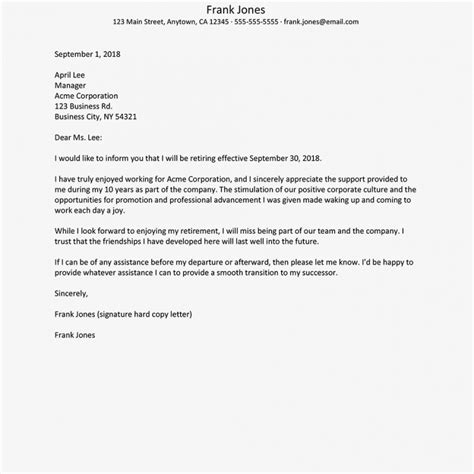Retirement Resignation Letters: Examples And Advice

Retirement is a significant milestone in a person’s life, marking the end of one chapter and the beginning of another. It is a time to reflect on one’s career and accomplishments and prepare for the next phase of life. One of the essential steps in the retirement process is resigning from your job. Writing a retirement resignation letter is a crucial part of this process, and it is important to do it effectively. In this article, we will provide examples and advice on how to write a retirement resignation letter that is professional and respectful.
1. Why write a retirement resignation letter?
A retirement resignation letter is an official communication that informs your employer of your intention to retire and the date of your retirement. It is a formal way to show appreciation to your employer and colleagues for the time you have spent working with them. Additionally, it helps to maintain a positive relationship with your employer, which may be beneficial in the future.
2. When to write a retirement resignation letter?
It is recommended to write a retirement resignation letter at least two weeks before your retirement date. This allows your employer to plan for your replacement and ensures a smooth transition for your colleagues and customers.
3. What to include in a retirement resignation letter?
A retirement resignation letter should include the following information:
3.1 Your intention to retire:
Clearly state that you are retiring and the date of your retirement. Example: “I am writing to inform you of my intention to retire from my position as [Job Title] effective from [Retirement Date].”
3.2 Gratitude:
Express your gratitude to your employer and colleagues for the opportunities and experiences you have had while working with them. Example: “I would like to take this opportunity to express my sincere gratitude for the support, guidance, and mentorship provided by the management and colleagues during my tenure.”
3.3 Offer to help:
Offer to assist in the transition process and ensure that your employer and colleagues are aware of any pending projects or tasks. Example: “I am willing to assist in the transition process, and I will ensure that all pending projects or tasks are completed before my retirement date.”
3.4 Contact information:
Provide your contact information so that your employer can reach out to you if necessary. Example: “Please feel free to contact me at [Phone Number] or [Email Address] if you require any further information.”
4. Tips for writing a retirement resignation letter:
4.1 Keep it professional:
Ensure that your letter is professional and respectful, avoiding any negative or critical remarks.
4.2 Keep it concise:
Keep your letter brief and to the point, avoiding unnecessary details.
4.3 Proofread:
Proofread your letter to ensure that it is free from errors and typos.
4.4 Express gratitude:
Express your gratitude and appreciation for the time you have spent working with your employer and colleagues.
5. FAQs
5.1. Is it necessary to write a retirement resignation letter?
Yes, it is essential to write a retirement resignation letter to inform your employer of your intention to retire and the date of your retirement.
5.2. When should I write a retirement resignation letter?
It is recommended to write a retirement resignation letter at least two weeks before your retirement date.
5.3. What should I include in my retirement resignation letter?
Your retirement resignation letter should include your intention to retire, gratitude, offer to help, and contact information.
5.4. How do I address my retirement resignation letter?
Address your retirement resignation letter to your immediate supervisor or manager. In conclusion, writing a retirement resignation letter is an important step in the retirement process. It is essential to ensure that your letter is professional and respectful and expresses your gratitude for the time you have spent working with your employer and colleagues. By following the tips and examples provided in this article, you can write a retirement resignation letter that is effective and maintains a positive relationship with your employer.
